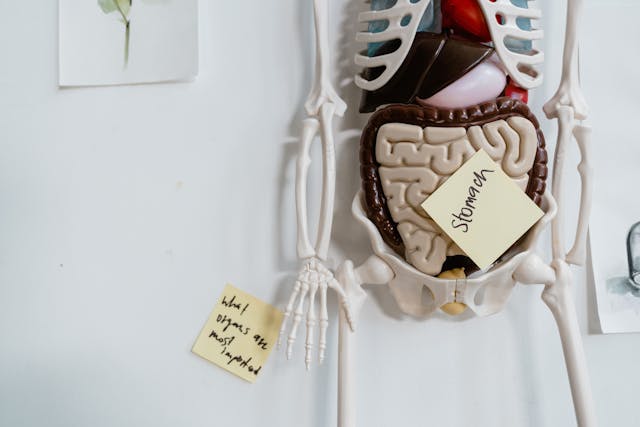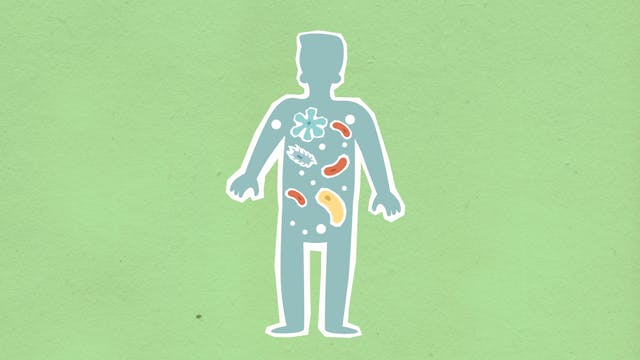Gut Health 101: How Your Microbiome Impacts Your Overall Health
We often hear the phrase “trust your gut,” but did you know that your gut plays a much bigger role in your health than just digestion? Inside your digestive system lives a powerful community of tiny organisms called the microbiome. These microbes help keep your body running smoothly—from boosting your immune system to affecting your mood. Let’s break down what gut health really means and how you can take care of it.

What Is the Gut Microbiome?
Your gut microbiome is made up of trillions of bacteria, viruses, fungi, and other microorganisms that live in your intestines. Most of them are good for you and help with important jobs like digesting food, making vitamins, and fighting off harmful germs.
Each person’s microbiome is unique, like a fingerprint. It begins forming at birth and is shaped by factors such as your diet, environment, and even whether you were born naturally or by C-section.
Why Gut Health Matters
1. Digestion and Nutrient Absorption
The microbiome helps break down food and absorb nutrients. Certain bacteria are especially good at digesting fiber and turning it into helpful compounds that keep your intestines healthy.
2. Immune System Support
About 70% of your immune system is located in your gut. A healthy microbiome helps your body know the difference between friendly bacteria and harmful invaders, reducing the risk of infections and inflammation.
3. Mental Health and Mood
There’s a strong connection between your gut and brain, often called the “gut-brain axis.” Your gut bacteria can influence the production of mood-related chemicals like serotonin. That’s why problems with your gut can sometimes lead to anxiety, depression, or brain fog.
4. Weight and Metabolism
Some research shows that the makeup of your gut bacteria can affect how your body stores fat, how hungry you feel, and how efficiently you burn calories. A balanced microbiome may help support a healthy weight.
5. Protection from Disease
An unhealthy gut may be linked to conditions like type 2 diabetes, heart disease, autoimmune disorders, and even some cancers. Taking care of your microbiome could help lower your risk of developing these issues.
Signs Your Gut Might Be Out of Balance
It’s not always easy to tell when your gut needs help, but here are some common signs:
-
Frequent bloating or gas
-
Diarrhea or constipation
-
Food sensitivities
-
Skin problems like acne or eczema
-
Fatigue or trouble concentrating
-
Mood changes or increased anxiety
If you’re experiencing any of these, it could mean your gut microbiome is out of balance, also known as “dysbiosis.”
How to Keep Your Gut Healthy
1. Eat a Variety of Plant-Based Foods
Fruits, vegetables, whole grains, nuts, and seeds are rich in fiber and nutrients that feed good gut bacteria. Try to eat many different colors of produce to support a wide range of microbes.
2. Include Fermented Foods
Foods like yogurt, kefir, kimchi, sauerkraut, miso, and kombucha contain probiotics—live beneficial bacteria that can help balance your gut.
3. Limit Processed Foods and Sugar
Highly processed foods and added sugars can harm your microbiome by feeding the bad bacteria. Try to reduce your intake of junk food and sugary drinks.
4. Take Prebiotics
Prebiotics are a type of fiber that feeds the good bacteria in your gut. They’re found in foods like garlic, onions, bananas, asparagus, and oats.

5. Stay Hydrated
Drinking enough water helps your digestive system function well and keeps things moving through your intestines.
6. Exercise Regularly
Physical activity can increase the diversity of your gut bacteria, which is a good sign of a healthy microbiome. Aim for at least 30 minutes of moderate movement most days.
7. Manage Stress
Chronic stress can upset the balance of your gut bacteria. Try stress-reducing activities like deep breathing, meditation, or spending time in nature.
8. Be Cautious with Antibiotics
While antibiotics are sometimes necessary, they can also wipe out good bacteria along with the bad. Only take them when prescribed, and consider taking probiotics afterward to help your gut recover.
When to See a Doctor
If you have ongoing digestive problems or think your gut health might be affecting other parts of your body, it’s a good idea to talk to a doctor or a registered dietitian. They can help you figure out the root cause and recommend a plan that fits your needs.
Final Thoughts
Your gut does much more than digest food—it plays a big role in your overall health. By eating a balanced diet, staying active, and making small lifestyle changes, you can support a healthy microbiome and feel better from the inside out. Taking care of your gut is one of the best things you can do for your body and mind.












